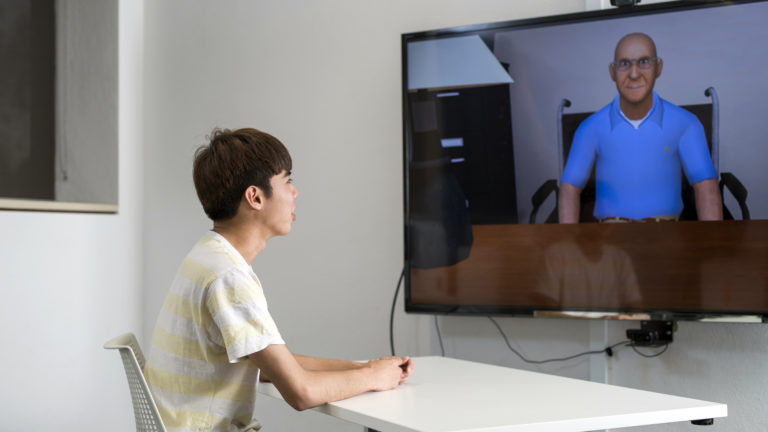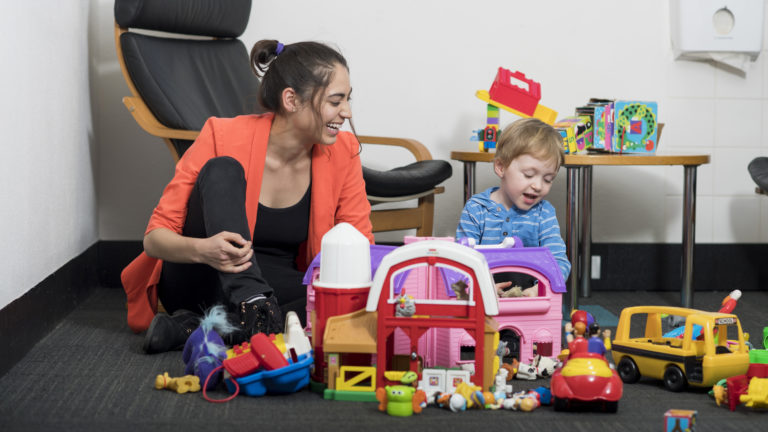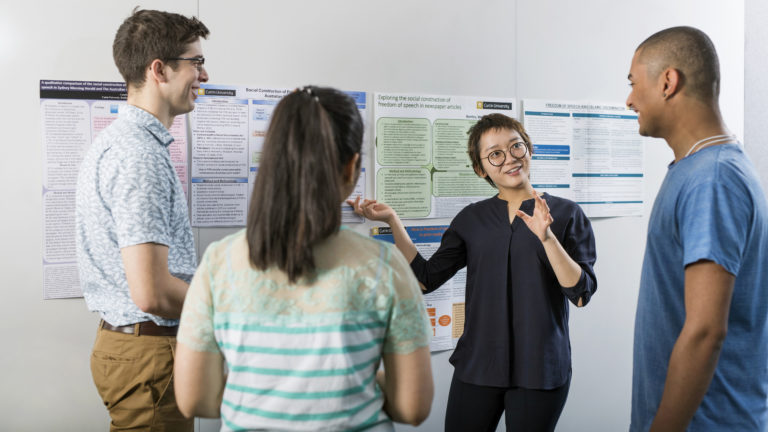Communication, language, speech sciences and swallowing
Our team is committed to understanding theories of typical and disordered communication and swallowing across the lifespan. We study at-risk populations, develop robust assessment tools to diagnose and measure treatment efficacy and evaluate intervention for people with communication and swallowing disorders.

We manage cultural and linguistic diversity and scholarship in training our future professionals to prepare them for a changing workplace.
Developmental speech and language disorders
Our research investigates theoretical underpinnings of speech, language and literacy with a focus on both assessment and intervention.

The applied nature of our interests is reflected in the development of robust assessment tools and our treatment effectiveness studies.
View researchers
Associate Professor Suze Leitao
Associate Professor Leitao’s research interests include development and disorders of speech, language and literacy, with a focus on developmental language disorder, youth justice and FASD; treatment effectiveness research, with a focus on Single Subject Designs; and ethical and professional practice.
Dr Claessen’s research interests include developmental disorders of speech, language and literacy, primarily developmental language disorder, speech sound disorder, discourse across the lifespan (including adults), treatment effectiveness (including adults) and working with culturally and linguistically diverse populations.
Dr Hennessey’s research interests are in the development of speech production, speech perception, language and cognition in typically developing and at-risk populations. Current research projects include early development in children who are at risk of speech, language and/or reading disorders, and the role of executive functions in normal and disordered speech, language and literacy development. An interest in stuttering disorders extends to investigating the relationships between speech motor, linguistic and self-regulation abilities in individuals who stutter.
Dr Smart’s research interests include speech sound development and disorders, infant feeding development, assessment and treatment of swallowing and feeding disorders in the paediatric population.
Dr Cocks’ research interests include dysphagia, aphasia, traumatic brain injury, acquired reading difficulties, right hemisphere communication disorder, the impact of communication impairment on gesture production and comprehension, and the impact of ageing on communication and swallowing.
Associate Professor Anne Whitworth
Associate Professor Whitworth’s research interests are in the assessment and treatment of aphasia and cognitive communication disorders, including dementia and traumatic brain injury, healthy aging, linguistic and culturally diverse populations (Indigenous and bilingual speakers with acquired communication disorders), and discourse impairments across the lifespan (including children and adolescents).
Dr Biedermann’s expertise spans from healthy cognition to its disorders including assessment and treatment. I use predominantly the neuropsychological approach to investigate spoken and written processes in developmental and acquired impairments. My current research focuses on the link between non-linguistic cognitive processes such as attention and language. A second focus of research comprises the underlying processes of bi-and multilingual speakers. I use behavioural techniques (e.g., mindfulness) and neurophysiological techniques (e.g., a brain-imaging techniques such as event related potentials (ERP)) to inform theory and clinical practice.
Acquired aphasia
Research into acquired aphasia is focused on the development and evaluation of novel assessment and intervention approaches for people with language difficulties following stroke. Recent projects have focussed on understanding models of bilingual aphasia, exploring the relationship between language and cognition, evaluating interventions targeting multi-level language and discourse, functional approaches to reading disorders, and meditation as an intervention strategy.
View researchers
Associate Professor Anne Whitworth
Associate Professor Whitworth’s research interests are in the assessment and treatment of aphasia and cognitive communication disorders, including dementia and traumatic brain injury, healthy aging, linguistic and culturally diverse populations (Indigenous and bilingual speakers with acquired communication disorders), and discourse impairments across the lifespan (including children and adolescents).
Dr Biedermann’s expertise spans from healthy cognition to its disorders including assessment and treatment. I use predominantly the neuropsychological approach to investigate spoken and written processes in developmental and acquired impairments. My current research focuses on the link between non-linguistic cognitive processes such as attention and language. A second focus of research comprises the underlying processes of bi-and multilingual speakers. I use behavioural techniques (e.g., mindfulness) and neurophysiological techniques (e.g., a brain-imaging techniques such as event related potentials (ERP)) to inform theory and clinical practice.
Dr Cocks’ research interests include dysphagia, aphasia, traumatic brain injury, acquired reading difficulties, right hemisphere communication disorder, the impact of communication impairment on gesture production and comprehension, and the impact of ageing on communication and swallowing.
Dr Claessen’s research interests include developmental disorders of speech, language and literacy, primarily developmental language disorder, speech sound disorder, discourse across the lifespan (including adults), treatment effectiveness (including adults) and working with culturally and linguistically diverse populations.
Associate Professor Suze Leitao
Associate Professor Leitao’s research include development and disorders of speech, language and literacy, with a focus on developmental language disorder, youth justice and FASD; treatment effectiveness research, with a focus on Single Subject Designs; and ethical and professional practice.
Cognitive communication disorders
Understanding cognitive communication disorders across dementia, traumatic brain injury and right hemisphere language disorders are a key focus.

Projects have included the assessment and treatment of linguistic and cognitive impairments in people with Alzheimer’s disease and primary progressive aphasia (PPA) and the assessment of communication difficulties associated with traumatic brain injury and right hemisphere communication disorder. Researchers are part of a thriving Dementia and Aged Care Community of Practice.
View researchers
Associate Professor Anne Whitworth
Associate Professor Whitworth’s research interests are in the assessment and treatment of aphasia and cognitive communication disorders, including dementia and traumatic brain injury, healthy aging, linguistic and culturally diverse populations (Indigenous and bilingual speakers with acquired communication disorders), and discourse impairments across the lifespan (including children and adolescents).
Dr Cocks’ research interests include dysphagia, aphasia, traumatic brain injury, acquired reading difficulties, right hemisphere communication disorder, the impact of communication impairment on gesture production and comprehension, and the impact of ageing on communication and swallowing.
Stuttering
Curtin University is an international hub for research into the nature of and intervention of stuttering disorders. In addition to the highly successful Stuttering Clinic on campus, national and international collaborations have led to some exciting translational research projects improving the quality of life for individuals who stutter and understanding the genetic profiles of stuttering disorders.
View researchers
Associate Professor Janet Beilby
Associate Professor Beilby’s research interests include the treatment of stuttering across the lifespan, Genetic and epigenetics of individuals who stutter. Recent research initiatives address Temperament and self-regulation research and training for children and parents, Virtual learning environments for training communication skills.
Dr Hennessey’s research interests are in the development of speech production, speech perception, language and cognition in typically developing and at-risk populations. Current research projects include early development in children who are at risk of speech, language and/or reading disorders, and the role of executive functions in normal and disordered speech, language and literacy development. An interest in stuttering disorders extends to investigating the relationships between speech motor, linguistic and self-regulation abilities in individuals who stutter.
Swallowing and feeding
This research aims at improving assessment of and treatment for swallowing and feeding disorders, as well as capturing current practice.

Key projects in this area have explored using acoustic analysis in understanding the swallowing sounds heard during cervical auscultation, the key components used by clinicians in bedside assessment, and exploring the level of understanding of healthcare professionals regarding the importance of oral hygiene in the management of swallowing and feeding.
View researchers
Dr Cocks’ research interests include dysphagia, aphasia, traumatic brain injury, acquired reading difficulties, right hemisphere communication disorder, the impact of communication impairment on gesture production and comprehension, and the impact of ageing on communication and swallowing.
Dr Smart’s research interests include speech sound development and disorders, infant feeding development, assessment and treatment of swallowing and feeding disorders in the paediatric population.
Dr Hennessey’s research interests are in the development of speech production, speech perception, language and cognition in typically developing and at-risk populations. Current research projects include early development in children who are at risk of speech, language and/or reading disorders, and the role of executive functions in normal and disordered speech, language and literacy development. An interest in stuttering disorders extends to investigating the relationships between speech motor, linguistic and self-regulation abilities in individuals who stutter.
Linguistic and cultural diversity
Exploring theories of bilingual language processing in healthy speakers and those with acquired neurological disorders is critical, along with understanding the influences of cultural and linguistic diversity in relation to the Australian Indigenous population across the lifespan.
View researchers
Dr Biedermann’s expertise spans from healthy cognition to its disorders including assessment and treatment. I use predominantly the neuropsychological approach to investigate spoken and written processes in developmental and acquired impairments. My current research focuses on the link between non-linguistic cognitive processes such as attention and language. A second focus of research comprises the underlying processes of bi-and multilingual speakers. I use behavioural techniques (e.g., mindfulness) and neurophysiological techniques (e.g., a brain-imaging techniques such as event related potentials (ERP)) to inform theory and clinical practice.
Associate Professor Anne Whitworth
Associate Professor Whitworth’s research interests are in the assessment and treatment of aphasia and cognitive communication disorders, including dementia and traumatic brain injury, healthy aging, linguistic and culturally diverse populations (Indigenous and bilingual speakers with acquired communication disorders), and discourse impairments across the lifespan (including children and adolescents).
Dr Claessen’s research interests include developmental disorders of speech, language and literacy, primarily developmental language disorder, speech sound disorder, discourse across the lifespan (including adults), treatment effectiveness (including adults) and working with culturally and linguistically diverse populations.
Scholarship of Health Professional Education
Innovative practice in clinical education is paramount to the Speech Pathology curricula. With projects encompassing resilience, millennial students and simulated learning, our research is applied and focuses on the ongoing creation and review of high quality clinical education experiences and preparation for all students, while concurrently extending the knowledge base in the field of clinical education.

View researchers
Ms Sanderson’s research interests are advancing the scholarship of health professional education; current research activities are in the area of student resilience and the expectations of the millennial learner.
Ms Quail’s research interests are in the scholarship of teaching and learning, specifically the area of clinical education – optimising clinical learning opportunities and best preparing and supporting students through their clinical experiences.
Associate Professor Janet Beilby
Associate Professor Beilby’s research interests include the treatment of stuttering across the lifespan, Genetic and epigenetics of individuals who stutter. Recent research initiatives address Temperament and self-regulation research and training for children and parents, Virtual learning environments for training communication skills.